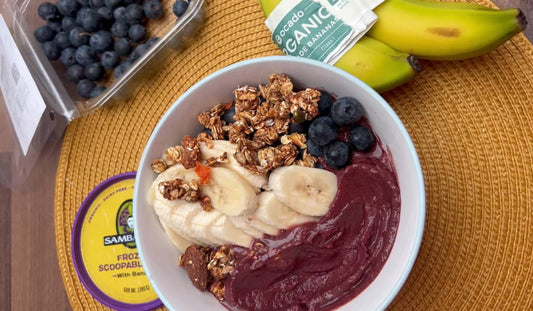SAMBAZON has teamed up with an amazing researcher from UC Berkeley to study biodiversity in SAMBAZON's harvesting area! Dr. Gabriel Damasco and his team of USA and Brazilian researchers have expertise in plants and a wide range of animals -- from mammals, to birds, reptiles, amphibians, and even insects! They have made a number of trips out into the Amazon Rainforest where our Açaí is harvested to discover the impact our Fair Trade and Organic Açaí harvesting is having on this natural world.

A biodiversity study looks at how complex the collection of plants and animals are in given areas. In general, the more kinds of plants and animals a habitat can sustain, the healthier it is. This is especially true in the Amazon Rainforest, a place with some of the most naturally occurring species richness on Earth!


Dr. Damasco and his team are finding that our Açaí harvesting is much better than the conventional farming done by clear cutting the Amazon. They have also found that our focus on protecting the plants and animals that live in harmony with the Açaí trees is even better than other conventional Açaí harvesting in similar areas! Dr. Damasco and his team have even found a few endangered and/or threatened species thriving in our forests like the festive Amazon (Amazona festive), the gray hatchback (Thamnophilus nigrocinereus), and the Tucano-de-white-throat (Ramphastos tucanus)...all of which are endemic to the Amazon region. Many other native species that are commonly used as food and medicinal resources are also found in the harvest areas. For instance, Tapereba (Spondias spp.), Bacuri (Garcinia spp.), Sucuuba (Virola spp.) and Almecega (Protium spp.).
Our local harvesters have acted as guides for Dr. Damasco and his team during their expeditions. These local harvesters are so knowledgeable and rightfully proud of the environment they harvest from. It is their hard work and dedication, with SAMBAZON's support, that has kept this part of the rainforest so productive for all the plants and animals.

We are not surprised by these early results and it is great that we can contribute to the scientific knowledge about the rainforest we have been working on for the last 20 years. Dr. Damasco and his team will be publishing papers soon about the technical aspects of their work, but in the meantime, make sure to follow @sambazon and subscribe to our email list to stay up to date on sustainability initiatives like this!








Comments
(0 Comments)Please note, comments need to be approved before they are published.